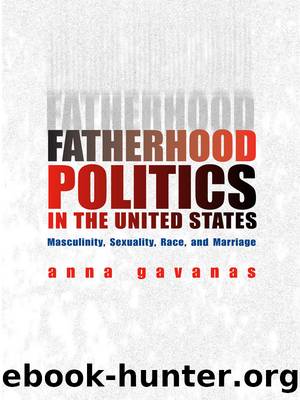Fatherhood Politics in the United States by Anna Gavanas

Author:Anna Gavanas [Gavanas, Anna]
Language: eng
Format: epub
ISBN: 9780252091377
Barnesnoble:
Publisher: University of Illinois Press
Published: 2010-10-01T00:00:00+00:00
Mediating Contradictory Masculinity Politics
The fragile-families wing reflects a contradictory mix of masculinist and egalitarian discourses on racialized and gendered relations. Fragile-families representatives draw on a tradition of political and academic discussion of the many ways that African American menâs aspirations for âfull manhood statusâ have been blocked and unrecognized since slavery (Madhubuti 1990; Majors and Billson 1992). The family sociologist Robert Staples is one of the scholars who have been widely criticized by feminist scholars, mainly for conservative essentialist and radical reductionist emphasis on African American menâs struggles for the political and economic power that allow white middle-class men to count as âmenâ (see also Franklin 1994). The African American feminist scholar bell hooks is one of the most well-known critics of masculinist perspectives in African American studies. She laments that African American men have never collectively critiqued dominant norms for masculinity and instead have assumed, like Staples, that male headship is a ânatural fact of lifeâ (1992, 96â97). She argues that the â[c]ontemporary black power movement made synonymous black liberation and the effort to create a social structure wherein black men could assert themselves as patriarchs, controlling community, family, and kin. On one hand, black men expressed contempt for white men yet they also envied them their access to patriarchal powerâ (1992, 98).
Here, hooks contributes to the feminist critique of the civil rights movement, which its leaders often described in terms of âclaims for manhood.â However, hooks also acknowledges the efforts of individual African American men who oppose sexism and âsubvert and challenge the status quoâ (1992, 100). I met quite a few representatives in the fragile-families wing who claimed to promote gender-egalitarian notions of masculinity and fatherhood. None of these representatives claimed to be feminist or pro-feminist. However, there was one fragile-families representative (Michael) who made a point of applying a feminist perspective and often criticized the gender politics of his colleagues. Even though he claimed his colleagues were resistance to feminist ideas, he kept trying to promote equality-based fatherhood programs from a feminist perspective, as is reflected in these interview comments:
I think it needs to be programs and agencies that are really helping men rethink masculinity. A lot of people say that word, but what I mean by that is: you have to have men really recognize what sexism is. You have to really help men recognize where oppression is, really work to change the power dynamics theyâre used to in their families.⦠And if you get men to do that, then you may have less men abandon families, because they will understand that there should be no leader in the familyâthere should be partnership when people decide to cohabitate or marry, or have a lifelong connection. There is no leader, no follower: people individually went together to deal with stuff. But men are so tired of all that, and they hear this from [retired Chicago Bears football linebacker] Mike Singletary, Vice President Gore, and all those other speakers, they hear that âOh, I have to be the moral leader of my family.
Download
This site does not store any files on its server. We only index and link to content provided by other sites. Please contact the content providers to delete copyright contents if any and email us, we'll remove relevant links or contents immediately.
| General | Men |
| Women in History |
Cecilia; Or, Memoirs of an Heiress — Volume 1 by Fanny Burney(31331)
Cecilia; Or, Memoirs of an Heiress — Volume 3 by Fanny Burney(30933)
Cecilia; Or, Memoirs of an Heiress — Volume 2 by Fanny Burney(30889)
The Great Music City by Andrea Baker(21264)
We're Going to Need More Wine by Gabrielle Union(18072)
Bombshells: Glamour Girls of a Lifetime by Sullivan Steve(13107)
Pimp by Iceberg Slim(12929)
All the Missing Girls by Megan Miranda(12746)
Fifty Shades Freed by E L James(12448)
Norse Mythology by Gaiman Neil(11882)
Talking to Strangers by Malcolm Gladwell(11875)
Crazy Rich Asians by Kevin Kwan(8348)
Mindhunter: Inside the FBI's Elite Serial Crime Unit by John E. Douglas & Mark Olshaker(7833)
The Lost Art of Listening by Michael P. Nichols(6469)
Enlightenment Now: The Case for Reason, Science, Humanism, and Progress by Steven Pinker(6405)
Bad Blood by John Carreyrou(5767)
The Four Agreements by Don Miguel Ruiz(5510)
Weapons of Math Destruction by Cathy O'Neil(5034)
We Need to Talk by Celeste Headlee(4868)
